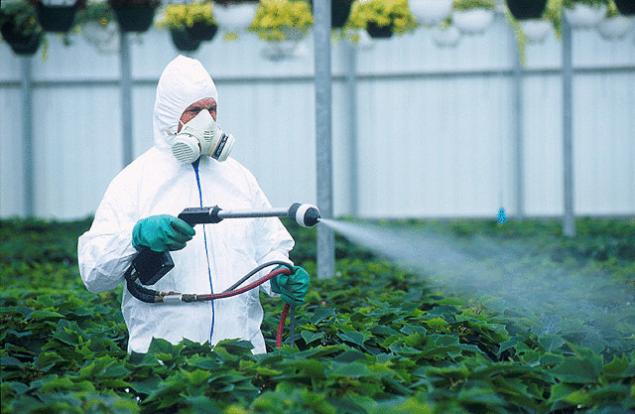479
The impact of pesticides on human health
High levels of pesticides in the blood, contribute to the resistance of tissues to insulin, leading to inability to process glucose, and, accordingly, causes diabetes of the 2nd type. Pesticides washed into the water when rains fall on the table not only with vegetables and fruit, but with fish. The body is not able to get rid of high concentrations of pesticides, which leads to a propensity to develop diabetes. It is proven that people with obesity with a high content of organochlorine pesticides in the body have a higher risk of developing diabetes of the 2nd type, because pesticides accumulate in fatty tissues.

Some pesticides accumulate in body cells, causing the development of obesity. This is due to the fact that certain pesticides act as substitutes for natural hormones, disrupting the body's ability to regulate proper hormone production. Which leads subsequently to metabolic syndrome and obesity.
Pesticides may be to blame for the occurrence of lymphoma, leukemia, brain cancer, breast cancer, prostate cancer, thyroid cancer, liver cancer, lung cancer, colon cancer.
The prenatal influence of some pesticides increases the risk of the child lung disease in the future, at the same time, the risk of disease in children increased directly proportional to the concentration of the pesticide in the mother's blood during pregnancy.
The harm of pesticides on the child's body manifests itself in hyperactivity in children or ADHD. This fact has been researched and proven by researchers in Canada and the USA. Only in America there are approximately 5 million children with the hyperactive syndrome. According to scientists, the main source of pesticides are vegetables and fruits, which lead to the emergence of hyperactivity in children.
Figuring out the nature of autism, the researchers came to the conclusion that the chemical substance pesticides, affecting genes during fetal development and in the first years of a child's life, impairs normal neurological functioning of the body, which leads to autism and other diseases development.
Harmful effects of pesticides designed to kill weeds and insects, greatly increases the risk of Parkinson's disease, which affects approximately 6.5 million people in the world. The researchers found that people exposed to long-term effects of pesticides, more than 70% more likely to develop Parkinson's disease. This group includes not only people whose work activity is connected with agriculture, but also those who used these pesticides at home or in the garden.
According to experts, pesticides have a negative impact on the human reproductive system, such as an increase in the number of miscarriages, increase fertility, decrease levels of the male hormone testosterone. A number of studies have shown that children conceived during the spring and summer months, when pesticide use is at the fastest rate, have the highest risk of birth defects such as down syndrome, cleft lip, clubfoot, etc.
It is a sad fact that the harm of pesticides leads to serious health disorders, therefore the use of organic and minimally processed food, and also avoiding contact with pesticides will help to reduce the risk of acquiring many diseases. published
P. S. And remember, just changing your mind — together we change the world! ©
Source: www.ecology.md

Some pesticides accumulate in body cells, causing the development of obesity. This is due to the fact that certain pesticides act as substitutes for natural hormones, disrupting the body's ability to regulate proper hormone production. Which leads subsequently to metabolic syndrome and obesity.
Pesticides may be to blame for the occurrence of lymphoma, leukemia, brain cancer, breast cancer, prostate cancer, thyroid cancer, liver cancer, lung cancer, colon cancer.
The prenatal influence of some pesticides increases the risk of the child lung disease in the future, at the same time, the risk of disease in children increased directly proportional to the concentration of the pesticide in the mother's blood during pregnancy.
The harm of pesticides on the child's body manifests itself in hyperactivity in children or ADHD. This fact has been researched and proven by researchers in Canada and the USA. Only in America there are approximately 5 million children with the hyperactive syndrome. According to scientists, the main source of pesticides are vegetables and fruits, which lead to the emergence of hyperactivity in children.
Figuring out the nature of autism, the researchers came to the conclusion that the chemical substance pesticides, affecting genes during fetal development and in the first years of a child's life, impairs normal neurological functioning of the body, which leads to autism and other diseases development.
Harmful effects of pesticides designed to kill weeds and insects, greatly increases the risk of Parkinson's disease, which affects approximately 6.5 million people in the world. The researchers found that people exposed to long-term effects of pesticides, more than 70% more likely to develop Parkinson's disease. This group includes not only people whose work activity is connected with agriculture, but also those who used these pesticides at home or in the garden.
According to experts, pesticides have a negative impact on the human reproductive system, such as an increase in the number of miscarriages, increase fertility, decrease levels of the male hormone testosterone. A number of studies have shown that children conceived during the spring and summer months, when pesticide use is at the fastest rate, have the highest risk of birth defects such as down syndrome, cleft lip, clubfoot, etc.
It is a sad fact that the harm of pesticides leads to serious health disorders, therefore the use of organic and minimally processed food, and also avoiding contact with pesticides will help to reduce the risk of acquiring many diseases. published
P. S. And remember, just changing your mind — together we change the world! ©
Source: www.ecology.md
Casting. First impression and partner selection
Forecast for the development of robotics from Robohunter























